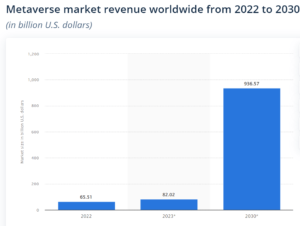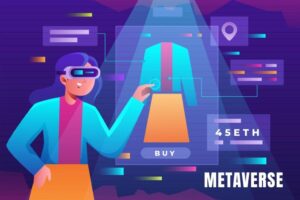
Embracing the Metaverse: A Revolution in Market Research
Introduction
Hey there! Have you ever imagined stepping into a world where you can explore a new world, meet people from across the globe, or even create your own business empire—all from the comfort of your home? Well, this isn’t science fiction anymore; it’s the metaverse, a digital universe that’s rapidly becoming an integral part of our lives. In this blog, we’ll embark on a journey through the metaverse, discovering its profound impact on various industries, the transformative role it plays in market research, and the challenges and opportunities it brings. So, put on your virtual goggles and join us!
What is the Metaverse?
Alright, let’s start with the basics. The metaverse isn’t just a trend; it’s a digital revolution. Picture this: a vast interconnected universe where you can game, socialize, work, shop, and even attend concerts—all within a virtual world. According to Statista, the metaverse market revenue is poised to be $936.57 billion market by 2030 from $65.51 Billion in 2022.

Figure: Statista: Meta Verse Market Revenue – 2022-2030
Take, for instance, the hospitality industry, where the metaverse promises to redefine guest experiences, offering tailor-made adventures in virtual paradises.
Impact of Metaverse on Different Industries
Now, let’s dive deeper into the metaverse’s transformative effects on various industries:
- FMCG (Fast-Moving Consumer Goods):
Imagine trying out different products virtually before making a purchase. FMCG companies are exploring this by offering immersive product experiences in the metaverse. - E-commerce:
The metaverse opens up new avenues for online shopping, with virtual malls and interactive storefronts becoming the norm. Brands are crafting virtual showrooms for customers to explore products. - Healthcare and Pharmacy:
Medical professionals are utilizing the metaverse for training simulations, telemedicine, and even creating virtual pharmacies for patients to access medications. - Retail:
Traditional brick-and-mortar stores are stepping into the metaverse, creating virtual versions of their outlets to cater to tech-savvy shoppers.

Figure: Use of metaverse in retail – Creation of Virtual Store
- Automotive:
Car companies are using the metaverse for virtual test drives and customizing vehicle features. - Sports:
Fans can attend virtual sports events and even interact with their favorite athletes in virtual meet-and-greets. - Gaming:
The metaverse has revolutionized gaming, enabling more immersive and interconnected gaming experiences. Gamers can own, trade, and sell virtual assets like in-game items and characters. - Manufacturing:
The metaverse facilitates virtual prototyping and product testing, reducing the need for physical prototypes and speeding up innovation. - Supply Chain and Logistics:
Companies are using the metaverse for simulations and optimizing supply chain operations. - Technology and Telecom:
Tech giants are actively investing in metaverse technology, from VR headsets to metaverse-driven social platforms.
The Role of Metaverse in Market Research
Market research is crucial for businesses to understand consumer preferences, trends, and competitive landscapes. The metaverse plays a pivotal role in this process by providing a new dimension for data collection, and data analysis. Market researchers can utilize the metaverse to gather insights into consumer behavior and preferences in a highly immersive and interactive environment.

Figure: Role of Metaverse in Market Research
Market Research on Metaverse
Market research on the metaverse focuses on understanding user behavior, preferences, and the impact of virtual experiences on purchasing decisions. It also involves analyzing market trends within the metaverse itself, such as the adoption rate of virtual currencies, the growth of virtual real estate markets, and the emergence of metaverse-based advertising.
Objectives of Metaverse Research
The primary objectives of metaverse research include:
- Understanding consumer behavior within the metaverse.
- Assessing the effectiveness of marketing campaigns in virtual environments.
- Identifying opportunities for product and service integration within the metaverse.
- Tracking trends and developments within the metaverse ecosystem.
Impact of Metaverse on Market Research
Now, let’s talk about the metaverse’s game-changing role in market research, backed by real-world examples:
a. Real-time Data Collection:
Market researchers can gather real-time data on user interactions and preferences within virtual environments. For instance, a company may analyze how users engage with their products in a virtual store.
b. Virtual Focus Groups:
Conducting focus groups in the metaverse leads to more natural and immersive discussions, providing richer insights. Brands can gain deep insights into consumer behavior and preferences.
c. Product Testing:
Companies can create virtual prototypes and gather feedback from users, reducing the cost and time associated with physical testing.
d. Enhanced Consumer Engagement:
Metaverse-based surveys and feedback mechanisms increase user participation and response rates. For example, a car manufacturer may ask virtual test drivers for feedback on a new vehicle model.
Challenges and Differences between Industries
Now, let’s address the challenges and differences between industries when it comes to adopting metaverse technologies:
Companies reluctant to embrace the metaverse will face several hurdles. Those who dive into the metaverse will have a head start in brand outreach and engagement. They can create marketing experiences that align with real-world activities or parallel their brand’s image. They’ll harness NFTs (Non-Fungible Tokens) and other platforms more effectively and invest in research to capitalize on virtual advertising within the metaverse. Immersive experiences will be their driving force, along with digitally hosted branded events and installations.
On the other hand, companies embracing the metaverse will offer digital collectibles and limited-edition items while actively engaging with communities on various virtual platforms. They’ll experiment with different tactics and encourage user-generated content within their ecosystems. Augmented reality (AR) advertisements will become the norm, enabling a more immersive advertising experience.
Hence, companies reluctant to embrace metaverse techniques risk falling behind in harnessing futuristic marketing technologies and strategies.
Best Practices of Using Metaverse in Market Research
Now, let’s uncover the best practices for harnessing the metaverse’s power in market research, backed by examples:
Immersive Surveys:
Create immersive survey experiences within the metaverse. For instance, an FMCG company could design a virtual supermarket where participants can interact with products and provide real-time feedback on their preferences.
Virtual Focus Groups:
Organize virtual focus groups in realistic settings. A retail company may conduct a focus group in a metaverse replica of their store, allowing participants to navigate and comment on their shopping experience.
Product Testing and Prototyping:
Use the metaverse for product testing and prototyping. An automotive company might build a virtual car showroom where users can explore different models, configuring them to their preferences and giving feedback.
Data Privacy:
Ensure robust data privacy practices within the metaverse. Implement encryption and user consent mechanisms. For instance, a healthcare provider conducting virtual medical simulations must guarantee the confidentiality of patient data.
User-Generated Content:
Encourage user-generated content and engagement. A gaming company could host competitions for users to create virtual in-game items, fostering a sense of community and excitement.
Cross-Platform Integration:
Seamlessly integrate metaverse data with traditional research methods. A tech company may combine data from virtual user interactions with conventional surveys to gain a comprehensive view of consumer preferences.
Conclusion
In conclusion, the metaverse is a transformative force that’s reshaping industries, consumer behavior, and even the way we conduct market research. From real-time data collection to virtual focus groups and enhanced consumer engagement, the metaverse is a game-changer in the world of market research.
But here’s the deal—making the most of the metaverse requires expertise, and that’s where Robas Research comes in. With over 11 years of experience in market research, ISO 27001 certification, and partnerships with global and local market research councils like MRSI and Insight Association, Robas Research is your go-to partner for navigating the metaverse. We are one of the top market research firms, top data processing market research companies in the world including Nevada, the USA, India, Europe, and the Middle East.
We’re not just market researchers; we’re pioneers in the field, and our presence at renowned events, for example, ESOMAR, Succeet Germany, and the Bangalore Tech Summit proves our commitment to staying at the forefront of cutting-edge technologies. So, when it comes to leveraging the metaverse and AI for market research, trust us to help you unlock new dimensions of consumer insights and business success.
From end-to-end market research (primary and secondary research) services to module-based market research needs like questionnaire design, survey design, launch, and online secondary research, syndicate research, recruitment guide, discussion guide to select the right candidate for market research, data collection, data analysis, big data analysis, deep learning, machine learning techniques, data insights, presentation – everything is done by Robas with experience in 20+ industries – Automotive, healthcare, FMCG, Retail, E-commerce, Technology, Gaming and more. We comply with data privacy and data security policies across the globe and use various secure methodologies of data collection. We are ON 24/7 and always finish projects on time. Expert in CSAT, Brand Track, NPS, Market Sizing/TAM studies along with Focus group interviews, in-depth interviews, known for quality recruitment.
So, are you ready to dive into the metaverse and revolutionize your market research game? The future awaits, and Robas Research is your trusted guide in this exciting journey.
Frequently Asked Questions about the Metaverse
What is the Metaverse?
The metaverse is a digital universe where users can interact, work, socialize, and play in immersive virtual environments.
How is the Metaverse Changing Industries?
The metaverse is transforming industries like gaming, healthcare, retail, and more by offering immersive experiences and new opportunities for engagement.
What is the Role of the Metaverse in Market Research?
The metaverse enhances market research by enabling real-time data collection, immersive focus groups, product testing, and more in virtual environments.
What Challenges Do Companies Face in Adopting the Metaverse?
Companies reluctant to embrace the metaverse may struggle with brand outreach, engaging users, and capitalizing on virtual advertising opportunities.
How Can Companies Embrace the Metaverse in Marketing?
Companies can embrace the metaverse by offering digital collectibles, hosting branded virtual events, and experimenting with immersive advertising strategies.
How Can I Ensure Data Privacy in the Metaverse?
Data privacy in the metaverse can be ensured through robust encryption, user consent mechanisms, and compliance with data protection regulations.
Is the Metaverse Limited to Gaming?
No, the metaverse extends beyond gaming to encompass various industries, including education, healthcare, retail, and more.
How Does the Metaverse Impact Consumer Behavior?
The metaverse influences consumer behavior by providing immersive experiences, enabling virtual product exploration, and enhancing brand engagement.
Can Small Businesses Benefit from the Metaverse?
Yes, small businesses can leverage the metaverse for marketing, customer engagement, and research, but they may need to start with a focused strategy.
What Are Non-Fungible Tokens (NFTs) in the Metaverse?
NFTs are unique digital assets that can be bought and sold within the metaverse, often representing ownership of virtual items or art.


